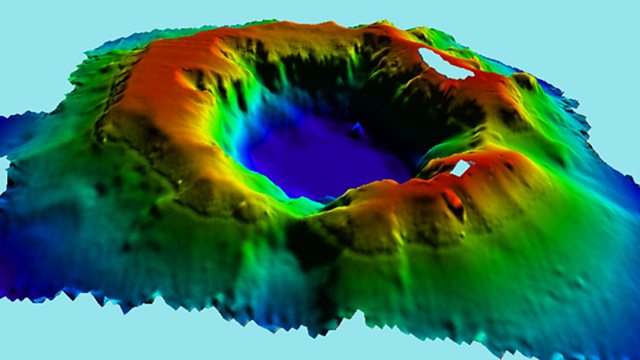Heat death by volcano and other stories
New insights into Tonga’s cataclysmic volcanic eruption revealed at the European Geosciences Union meeting in Vienna – a huge gathering of earth scientists from around the world.
This week Science in Action comes from a vast gathering of earth scientists in Vienna, at the general assembly of the European Geosciences Union.
Roland Pease hears the latest insights into the cataclysmic eruption of Hunga Tonga in the Pacific ocean from volcanologist Shane Cronin of the University of Auckland. He also talks to NASA's Michael Way about how the planet Venus might have acquired its hellish super-greenhouse atmosphere, and how the same thing could happen to planet Earth. There’s intriguing research from geologist John Tarduno of the University of Rochester that hints of a link between the ups and downs of the Earth’s magnetic field and the evolutionary history of animals. Fraser Lott of the UK's Hadley Centre explains his ideas for calculating an individual person's responsibility for climate change-driven extreme weather events.
And ...
On Crowd Science, why can't I find gold in my back yard?
If you go outside with a spade and start digging, the chances are you won't find any gold. You might get lucky or just happen to live in a place where people have been finding gold for centuries. But for the most part, there'll be none. But why is that? Why do metals and minerals show up in some places and not others?
It's a question that's been bothering CrowdScience listener Martijn in the Netherlands, who has noticed the physical effects of mining in various different places while on his travels. It’s also a really important question for the future – specific elements are crucial to modern technology and renewable energy, and we need to find them somewhere.
Marnie Chesterton heads off on a hunt for answers, starting in a Scottish river where gold can sometimes be found. But why is it there, and how did it get there? Marnie goes on a journey through the inner workings of Earth's geology and the upheaval that happens beneath our feet to produce a deposit that’s worth mining.
On the way she discovers shimmering pools of lithium amongst the arid beauty of the Atacama Desert, meets researchers who are blasting rocks with lasers and melting them with a flame that’s hotter than the surface of the sun, and heads to the bottom of the ocean to encounter strange potato-sized lumps containing every single element on Earth.
And maybe, just maybe, she’ll also find gold.
Image: Multi-beam sonar map of Hunga Tonga volcano post-eruption
Credit: Shane Cronin/Uni of Auckland/Tonga Geological Services
Presented by Roland Pease and Marnie Chesterton
Report by Jane Chambers
Produced by Andrew Luck-Baker and Ben Motley
Last on
More episodes
Credit
| Role | Contributor |
|---|---|
| Unknown | Shane Cronin/Uni of Auckland/Tonga Geological Services |
Broadcasts
- Sat 28 May 2022 23:06GMT����ý World Service South Asia & East Asia only
- Sun 29 May 2022 00:06GMT����ý World Service except East Asia & South Asia
Podcast
-
![]()
Unexpected Elements
The news you know, the science you don't


